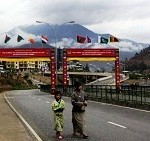What is the agenda of the upcoming SAARC meeting?
The theme of the 18th SAARC Summit to be held in Kathmandu, Nepal, on November 26-27 is ‘Deeper Integration for Peace and Prosperity’. South Asian nations are set to sign three framework agreements related to connectivity—the Agreement for the Regulation of Passenger and Cargo Vehicular Traffic amongst SAARC Member States, the SAARC Regional Agreement on Railways, and the SAARC Framework Agreement for Energy Cooperation (Electricity). In addition to these three agreements, a 31-point Kathmandu Declaration will be issued on the concluding day of the summit.
What are the issues that will dominate the discussions at the summit?
The summit next week is expected to make a commitment to eradicate illiteracy by 2030 from the region and to address violence against women; it will also stress on providing high-quality education that will help build skills and knowledge, ensuring employment opportunities for youth, and according respect to senior citizens; and it will call for ending all forms of terrorism.
Other important issues which are expected to be addressed are climate change, poverty alleviation, and the promotion of tourism, trade, and investment.
The proposal for a SAARC Development Bank, put forth by India in July this year and well received by member countries, is also likely to feature prominently at the meeting in Nepal
What is the progress on past accords and agreements within SAARC?
At the last summit in the Maldives, four agreements were signed—the SAARC Agreement on Rapid Response to Natural Disasters, the SAARC Seed Bank Agreement, the SAARC Agreement on Multilateral Arrangement on Recognition of Conformity Assessment, and the SAARC Agreement on Implementation of Regional Standards.
However, tangible progress on major agreements such as SAFTA seems to have stalled; the roadman drawn for the implementation of a South Asian Customs Union and a South Asian Economic Union during the 14th SAARC Summit in New Delhi in 2007 has not yet materialised; and the 2010 SAARC Agreement on Trade in Services has not progressed much.
What are the issues that are not being adequately addressed?
India’s proposal for a SAARC power grid and the proposal made by Sri Lankan President Mahinda Rajapaksa for a SAARC currency are issues that must be duly considered. A power grid will be an important milestone in achieving energy cooperation in the region. A clear roadmap must be drawn for the timely and effective implementation of these proposals at the upcoming meet.
What is the future of SAARC?
If SAARC is to remain relevant, it is necessary to evaluate the progress made on SAFTA after it was signed at the 12th SAARC Summit in Islamabad, Pakistan, in 2004. Eight years after SAFTA came into force in 2006, intra-regional trade today accounts for only around 5% (according to data of the Ministry of External Affairs, Government of India) of the aggregate global trade of its member countries. This compares poorly to intra-regional trade within the European Union, as well as within ASEAN (the Association of Southeast Asian Nations).
The declaration at the 17th Summit in the Maldives stressed that SAARC countries will intensify efforts to fully implement SAFTA. It said that member countries would work to reduce the Sensitive Lists in trade as well as speedily resolve non-tariff barriers, and expedite the process of harmonising standards in goods traded and customs procedures.
However, the single biggest impediment to the future of SAARC is the relationship between India and Pakistan, which must be addressed if the association is to move forward.
Sharmadha Srinivasan is a Junior researcher at Gateway House. She has earlier interned at Espirito Santo Securities in the capacity of an economist, and at the Institute of Economic Affairs in London as a researcher.
This article was exclusively written for Gateway House: Indian Council on Global Relations. You can read more exclusive content here.
For interview requests with the author, or for permission to republish, please contact outreach@gatewayhouse.in.
© Copyright 2014 Gateway House: Indian Council on Global Relations. All rights reserved. Any unauthorized copying or reproduction is strictly prohibited


